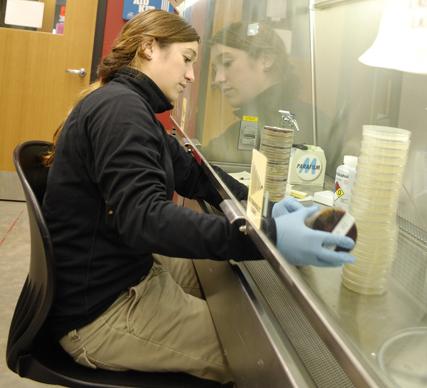 Ed Morris/Assistant Photo editor
Ed Morris/Assistant Photo editorNorthern Kentucky University received a grant of $2.8 million from the National Institutes of Health (NIH) through the University of Louisville, which will be used over the next five years. NKU will share the funds with Western Kentucky University, Morehead State and Eastern Kentucky University. Of the four universities, NKU received the most funds due to their track record of mentoring undergraduate research.
This is the largest amount of funding NKU has received. In 2009, additional faculty members applied to renew the grant, citing the progress made from the original grant. NIH renewed the grant.
The grant’s purpose is to aid and to further develop faculty and undergraduate research in biomedical science. Nine research projects were generated from the grant, each investigation researching a different area of biomedical science.’ ‘
The $2.8 million dollars has done more than fund research projects at NKU, it has also helped create more student jobs given NKU students a hands-on experience with projects that many have only read about. With the funds the university hired post-doctoral research fellows who also teach some lab courses at NKU and full-time research technicians, several of whom are NKU grads.
‘Funds are also used to purchase equipment that you might see at a large research intensive school,’ said Mark Bardgett, Psychological Science Professor at NKU. ‘Having such equipment here allows faculty and students to perform research on state-of-the-art devices, which enables such research to keep pace with that being done at more prestigious schools, and allows students to use equipment and perform procedures that most undergraduates in most universities only hear about.’
The University has been receiving funds from the NIH through the Kentucky Idea Network for Biomedical Research Excellence or KY-INBRE. The KY-INBRE program is responsible for the disbersement of NIH funds.
In 2004, NKU faculty members Dr. Hazel Barton, Dr. Patrick Schultheis and Dr. Mark Bardgett sumbmitted applications for funding from NIH, securing approximately $2 million in research funding for five years. Each of the three scientists specialize in different kinds of research.
Barton deals with microbes that grow in extreme environments such as Antarctica. Her research helps scientists understand how bacteria becomes resistant to certain medicines. Schulthesis focuses on characterizing how the gene that causes Parkinson’s disease works in cells.
The equipment and supplies provided by KY-INBRE are sometimes used in instructional labs. ‘This means that not only are the students who perform research exposed to state-of-the-art equipment and techniques, but many students who come through lab courses in Biological Sciences, Chemistry, and Psychological Science are exposed as well,’ Bardgett said.
Due to NKU students having this unique experience at the University’s labs,’ ’employers are more likely to hire them, there are many former students who are employed in research labs at the University of Cincinnati and Children’s Hospital in part because of their experience with such equipment and techniques.,’ Bardgett said.
Students at NKU engage in research that other students at larger universities are not permitted to participate in. ‘Therefore, they graduate with unique experiences and enviable resumes that make them much more attractive to graduate schools, professional schools and employers,’ Bardgett said.
Which may be the story of Jordan Wagge, who participated in Bardgett’s behavioral neuroscience research lab a few years ago Wagge just recieved her Ph.D. in cognitive psychology and is now a tenure-track faculty member at Avila College outside Kansas City.
‘I’m sure Jordan’s success is a testament to her alone, but I’d like to think that her work on KY-INBRE funded research inspired her to continue performing research and helped to get (her) into grad school and stay there,’ Bardgett said. ‘Since Kentucky ranks low in the number of graduate degrees per population, programs like KY-INBRE should help inspire even more students to continue their studies into graduate school and equip them with the experience and confidence that they need to succeed there.’

